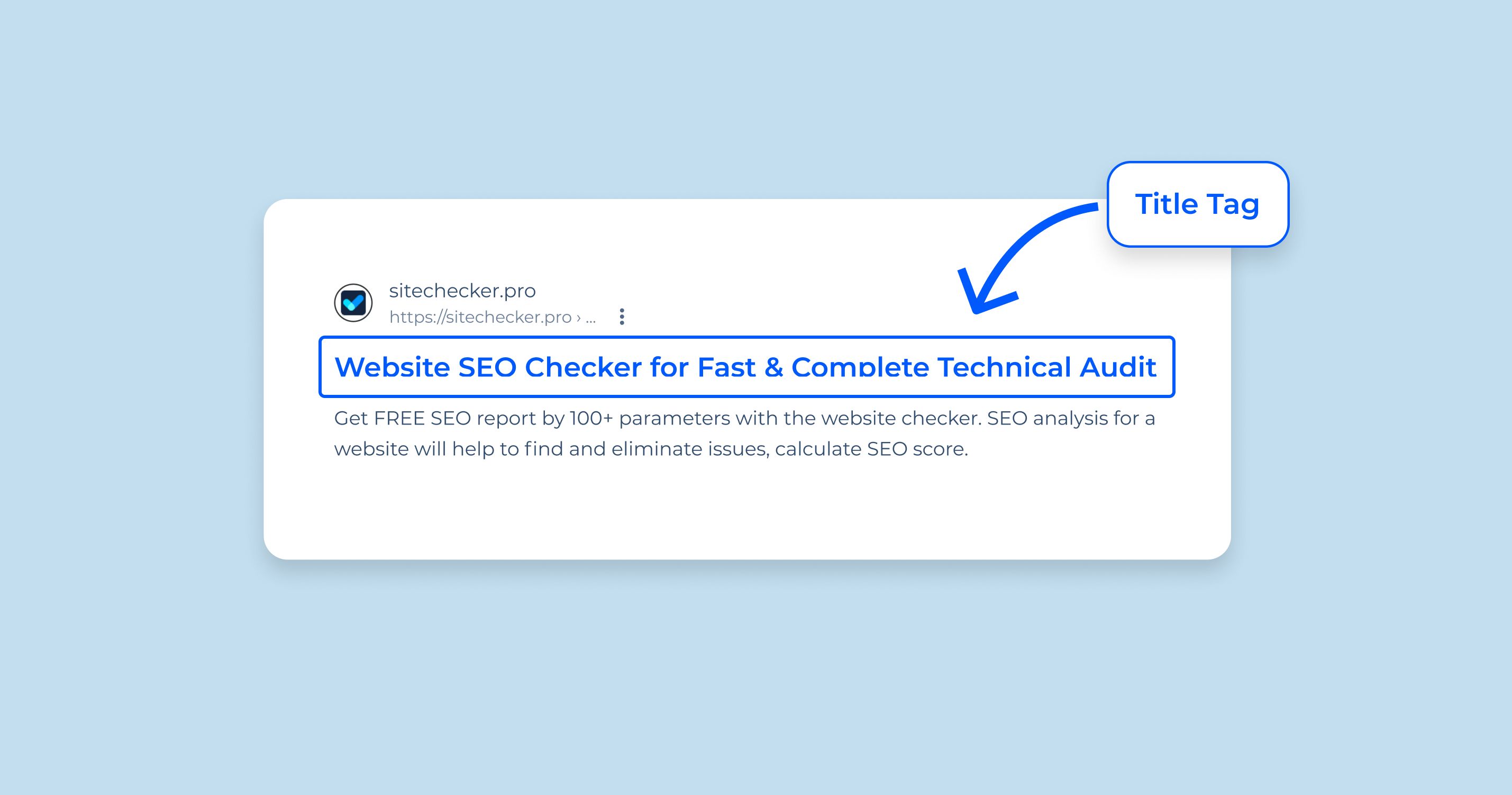Title tags are HTML elements that specify the titles of web pages. They are critical for SEO, usability, and social sharing.
Title tags serve as a primary cue to search engines and users about a page’s content. They appear in search engine results pages (SERPs) as clickable headlines and are vital for improving a website’s SEO ranking. A well-crafted title tag can influence click-through rates, making them essential for capturing user attention.
They’re typically limited to 50-60 characters to ensure they display properly across various platforms. SEO best practices recommend including relevant keywords near the beginning of the title tag to signal its importance to search engines, while also making sure it’s appealing and informative for users. Crafting effective title tags is a balance between SEO optimization and user-friendliness, with the goal being to increase both visibility and engagement.
Importance Of Title Tags
Enhancing Search Visibility
Title tags are essential for search visibility. They are the first impression of your content on the search engine results pages (SERPs). A well-crafted title tag can improve your rankings and attract more clicks. Here’s why title tags matter:- Search engines use title tags to understand the relevance of a webpage.
- A unique and compelling title tag can stand out in SERPs.
- Including relevant keywords in title tags helps in matching user queries.
Improving User Experience
User experience starts with the title tag. It sets expectations for the content ahead. Here’s how a well-crafted title tag can improve user experience:- Title tags summarize content, letting users decide its relevance quickly.
- Clear and descriptive titles reduce bounce rates.
- Accurate titles lead to higher satisfaction as users find what they expect.

Key Elements Of Title Tags
Title Length And Structure
Title length matters for both search engines and users. Ideally, a title tag should be 50-60 characters long. This ensures the title displays properly in search results. A well-structured title tag includes the primary keyword at the beginning, followed by a secondary keyword and your brand name at the end. This order may vary based on your SEO strategy.Keyword Inclusion
Keywords in title tags tell search engines what your page is about. They should match the user’s search intent. Use the targeted keyword early in the title to emphasize its importance. Avoid keyword stuffing as it can harm your SEO performance. Also, consider using long-tail keywords for specific queries.Relevance To Content
Your title tag must accurately reflect the page’s content. This builds trust with your audience. Make sure your title remains contextually relevant to the information on the page. This relevance helps search engines match your page to the right searches. An effective title tag mirrors the content and provides a clear, concise summary of what users will find after clicking.Best Practices For Title Tags
Creating Unique Titles For Each Page
Each page on your website should have a distinct title tag. It tells search engines and users what the page is about. Duplicate titles can lead to poor user experience and harm your SEO efforts.- Match the title to the page content to keep it relevant.
- Use primary keywords at the beginning if possible.
- Keep it under 60 characters to ensure full display in search results.
Avoiding Keyword Stuffing
Stuffing keywords in your title tag can appear spammy and hurt rankings. Keep it natural and user-friendly.- Focus on one or two main keywords per title.
- Ensure the title is readable and flows well.
- Write for users, not just search engines.
Utilizing Brand Name
Including your brand name in title tags can boost recognition and build trust. It’s especially important for the homepage.- Place the brand name at the end of the title, unless it’s a well-known brand.
- Separate brand name from the rest of the title with a pipe or dash.
- Keep the brand name consistent across all titles.
Impact Of Title Tags on SEO
Title Tags And Search Engine Rankings
Title tags are critical for search engine rankings. They give search engines a quick summary of your content. A well-crafted title tag includes relevant keywords. These keywords match what people are searching for. Search engines use these tags to rank your page. Remember, title tags appear as the clickable headline on search result pages. They should stick to a 50-60 character limit. This ensures they show properly across platforms.Title Tags And Click-through Rates
The right title tag can skyrocket your click-through rates. It’s the first impression to entice users to visit your website. A captivating title tag stands out in search results. This encourages more clicks. Improved click-through rates signify relevant content, pushing you up in rankings. Use action words and benefits in your title tags to engage users. Make them curious or offer solutions. Concise, clear, and compelling title tags get more people to click on your link. See the difference:| Before Optimization | After Optimization |
|---|---|
| Home Page – My Website | Discover Top Travel Tips for 2023 | Voyager’s Guide |
| Product 1 Info | Buy Fresh Organic Honey – Pure & Natural | BeeStore |
Title Tags Vs. Meta Descriptions
Distinguishing Between Title Tags And Meta Descriptions
Title tags and meta descriptions serve different roles. Title tags are the clickable headlines that appear in SERPs. They are critical for SEO, usability, and social sharing. Meta descriptions are brief summaries that appear under the title tags. They explain a page’s content.| Title Tags | Meta Descriptions |
|---|---|
| Show in browser tabs and SERPs. | Appear below the title tag in SERPs. |
| Typically 50-60 characters long. | Often between 150-160 characters. |
| Should include main keywords. | Should provide clear page summaries. |
| Impact search rankings. | Don’t directly affect rankings. |
Their Complementary Roles
Think of title tags as signposts and meta descriptions as invitations. The title tag guides users and search engines. The meta description offers a preview to encourage clicks. Together, they work to boost visibility and attract traffic to your website.- Title tags lead the charge in search rankings.
- Meta descriptions support with compelling messages.
- Both must be clear, concise, and relevant.
- Use them to set expectations about your content.

Credit: sitechecker.pro
Common Title Tag Mistakes
Generic Or Duplicate Titles
Unique titles make pages stand out. Here are mistakes to avoid:- Reusing titles: Each page should have a distinct title.
- Vague titles: Specific and relevant titles grab attention.
- One-size-fits-all approach: Tailor titles to the content.
Ignoring The Importance Of Title Tags
Title tags are not just an HTML element. They serve as a first impression. Avoid these oversights:- Skipping tags: Always include a title tag.
- Missing keywords: Use relevant keywords for SEO.
- Lack of creativity: Engage readers with interesting titles.
Evaluating And Modifying Title Tags
Analyzing Performance Through Analytics
Email campaigns, social media traction, and organic search rankings rely on well-crafted title tags. Use analytics tools to gauge their success. Look for trends in click-through rates (CTR) and search engine positions.- High CTR? Your title tag is likely appealing.
- Low CTR? It may need a rework.
Optimizing Titles For Better Results
To boost your title tags, consider these tactics:- Include Target Keywords: Ensure primary keywords are present.
- Stay Within Limit: Keep titles under 60 characters to avoid cutoffs.
- Be Descriptive: Clarify your page’s content instantly.
- Invoke Curiosity: Encourage clicks with intriguing titles.
Future Trends In Title Tag Optimization
Integration With Voice Search
Title tags and voice search are becoming friends. With more people using voice for internet queries, title tags need tweaking. They must answer questions people ask aloud. This means using natural language and question-based formats. For example:- Old Tag: “Best Running Shoes 2024”
- Future Tag: “What Are the Best Running Shoes for 2024?”
Evolution With Search Engine Algorithms
Search engines like Google change often. They get smarter at understanding what a page is about. This means title tags must also evolve. Expect title tags to adapt to:- Semantic Search: Using related words, not just keywords.
- User Intent: Answering the user’s real question.
- Context: Reflecting the page content accurately.

